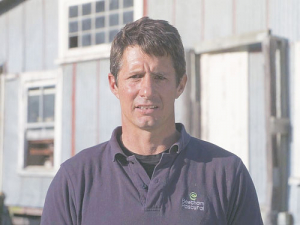Getting sheep shape at Pyramid Farm
The vineyards at Pyramid Farm in Marlborough’s Avon Valley have never been run of the mill, with plantings that follow the natural contours of the land, 250 metres above sea level.
 Wairarapa farmer William Beetham, keen on good health and safety in his woolshed, features in the Tahi Ngātahi videos.
Wairarapa farmer William Beetham, keen on good health and safety in his woolshed, features in the Tahi Ngātahi videos.
Sheep farmers are offered a safety course via online videos in which farmers and shearers explain how to reduce injuries in and around the woolshed.
The aim is to improve safety and performance in the wool growing and harvesting industries.
The scheme, led by Tahi Ngātahi, is a joint effort by Federated Farmers, the New Zealand Shearing Contractors Association, Worksafe and ACC -- the latter putting up $1 million over three years.
Farmers, shearers and their staff who complete the course receive a certificate. Shearing contractors can show farmers that they and their staff are Tahi Ngātahi certified, and farmers can do a ‘warrant of fitness’ course to help them make their shed safety-compliant.
Wool harvesters suffered 755 work-related injuries in 2017, resulting in 9300 working days lost, according to ACC weekly compensation data. Also that year saw 4700 work-related injuries among wool growers, resulting in 35,000 days lost.
WorkSafe’s Al McCone says the scheme’s positive steps will reduce harm from working in and around the woolshed. More farmers attaining using the woolshed ‘wof’, and more advanced equipment, will have an effect.
Wairarapa farmer William Beetham, who features in the videos, is keen on raising safety levels in his business.
“The first thing is recognising you have to make a start with health and safety,” he says. “It is easy and makes things run more efficiently.
“Most farmers would be much better off by spending a bit of time getting those systems in place.”
For shearers the emphasis is on eating and hydrating well, strengthening and stretching their bodies and getting enough sleep.
Taihape shearer Dave Sargenson (66) is still shearing after 40 years, but says that’s not common.
“In that time shearers have not lasted too well, but with better health and safety many would have been able to shear longer.”
Lamb shearing world record holder EmilyWelch explains in the videos that a few minutes a day can prevent injuries and improve performance.
“It takes five minutes to do strength work and another five minutes at the end of your day stretching out. You’ll reap the benefits years down the road.”
Tahi Ngātahi project manager Trish Ryan says the videos teach everyone about their role in creating a safe workplace.
“Tahi Ngātahi means one, together, and we believe we can prevent injuries by helping the whole team understand each other’s roles in and around the shed.
‘It’s a great resource for everyone in the industry, including farmers and staff who use a shearing contractor or have an open shed, or do some shearing or crutching over the year.
“While many can shear, they may be able to improve their approach so they don’t injure themselves.’’
Tahi Ngātahi is being introduced to farmers and shearers at meetings and will be formally launched at the New Zealand Agricultural Show in November. North Island meetings will run in early September and South Island meetings will run from September 19-21.
Upcoming meetings
|
Date |
Centre |
Venue |
Refreshments |
Tahi Ngatahi introduction |
|
Sep 19 |
Gore |
Heartland Hotel, 100 Waimea St |
3-3.30pm |
3.30-5pm |
|
Sep 20 |
Geraldine |
Stonebridge, 16 Shaw St |
3-3.30pm |
3.30-5pm |
|
Sep 21 |
Cheviot |
Cheviot Trust Hotel, SH1 |
3-30pm |
3.30-5pm |
A buoyant farm economy should make for a successful 2026 Southern Field Days, says chairman Steve Henderson.
OPINION: November 7 has been set by Christopher Luxon as ‘E day’ – election day.
The strong wool market has improved in the past six months, despite drops in production over recent years.
On January 5th at Te Pa Station, the World Sheep Shearing Records saw a new nine-hour strong wool ewes shearing record set by Simon Goss.
Recently awarded in the New Years Honours List for Services to Agriculture and Governance, well known dairy farmer Lloyd Downing has become an Officer of the New Zealand Order of Merit (ONZM).
International trade expert Stephen Jacobi says Winston Peters' objections to the Indian free trade deal are "ridiculous".